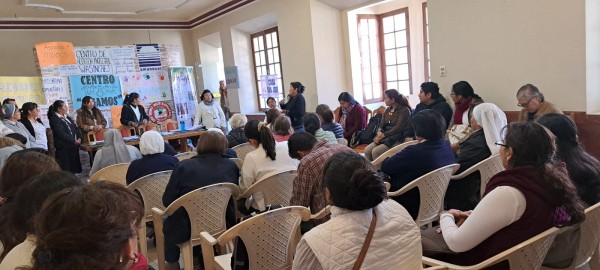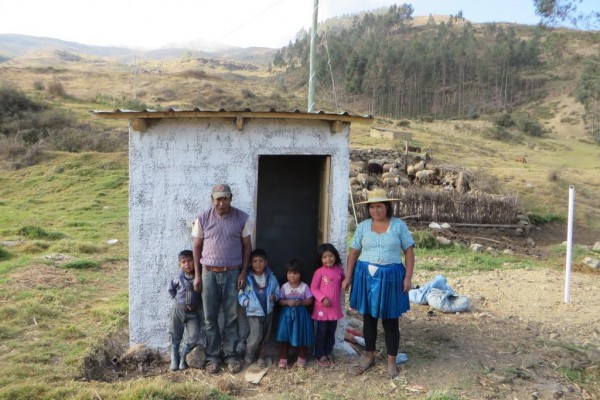
Can you imagine the value of a hug for an abandoned child? Or the hope in the eyes of a teenager who has suffered so much and is beginning to dream of a brighter future for himself? Or the simple security of a hot meal for a child who has nowhere else to eat? Well, that is the reality of Casa San José, a home run by the Community of Saint Paul, and of other 72 foster homes here in Cochabamba, Bolivia. Every day we open our doors and our hearts to the most vulnerable, giving them a ray of hope in the midst of adversity.
At Casa San José, each year we provide that hope to approximately 115 children and adolescents who are at risk of homelessness, offering them the opportunity to rebuild their lives and return to the warmth of a family. Your generosity has been a beacon on this journey, allowing us to offer them not only a roof and a livelihood, but also the possibility of dreaming of a different tomorrow. Thank you so much for your constant support, which is vital to our task!
However, a bureaucratic shadow threatens this essential work, as well as that of 72 other homes that together serve nearly 4,500 children and adolescents in the region. Incomprehensibly, the Autonomous Municipal Government of Cochabamba, instead of being an ally in the protection of vulnerable children—a responsibility conferred upon them by law—is imposing obstacles that seriously jeopardize our own sustainability. This situation affects various religious and secular institutions that manage these shelters.
Recently, the governor's office imposed the Departmental Law 1006, a regulation that, without consulting us or recognizing our altruistic dedication, unfairly equates us with for-profit companies. The direct result: costly and unnecessary procedures that undermine our autonomy and compromise the vital care we provide to the children who need it most.
We are not asking for privileges, but for justice and recognition for the work we do, fulfilling a responsibility of the State. We cannot allow our work to be hindered, jeopardizing the well-being of the children who depend on us for their protection and development. The imposition of this law could force us to make drastic decisions, including closing our doors, leaving hundreds of children and adolescents without shelter —who now find a safe and hopeful refuge in Casa San José and other foster homes.
Faced with this critical situation, we ask ourselves with deep concern: where will the children go if we cannot continue to offer them a future? At Casa San José and the other foster homes, we are standing up to fight for the repeal of this unjust law. We want to keep you informed about this crucial battle we are waging for the future of the most vulnerable. In this arduous struggle for the continuity of our work and the well-being of the children, the various organizations that manage the 73 homes have joined forces to express our deep concern to the authorities and the public. We sincerely hope that our voices will be heard and that we can establish a constructive dialogue that will allow us to reach a fair and reasonable consensus to continue helping thousands of vulnerable children. Thank you for always being by our side!
The Community of Saint Paul continues with its program of establishing latrines in Independencia, Bolivia

Ten months ago, we took on a new challenge in the rural area of Independencia (Cochabamba, Bolivia): the construction of simple but decent bathrooms for the families of the farming communities.
The farmers in this rural area live in houses built in a traditional way with adobe, wood and stone with thatched roofs. The residents of these communities do not have toilets or latrines, they go to the countryside to relieve themselves and have health problems, among others, due to the contamination of drinking water sources.
The bathrooms that we are starting to build are 2m x 1.5m, consist of a toilet, a shower and a tap outside the bathroom to catch the water and throw in the cup and to wash one’s hands. They are basic, but they allow families not to go outdoors to relieve themselves. We also saw the importance of the shower, since after doing interviews to the families going house by house we realized that they do not have a private space to wash and most of them bathe only once a month! We must bear in mind that we are at 3,500 meters above sea level, in a region of intense cold.
Currently 24 homes of the rural community of Totorani and 15 of Chulpani already have a decent bathroom to shower with hot water and to do their physiological needs with privacy and without polluting the environment.
Throughout the process of the implementation of the restrooms, the beneficiary families are actively participating, both in the choice of the technological option and materials, as well as in the conditions and commitments on their part. In addition, a hygiene and basic sanitation workshop has been developed with families to address issues such as health, individual and domestic hygiene, environmentally friendly practices, rational use of water and care and use of the bathroom. In this way, emphasis is placed on improving hygienic habits and ensuring the sustainability and proper use of bathrooms in homes.
The 39 families that already have their bathroom in their home are very happy and enthusiastically see the possibility that their children get sick less of diarrhea and are cleaner. They are aware that by using the bathrooms their environment improves, they have also gained in dignity and have shown that by organizing and working together everyone wins.
And we will continue with more bathrooms, because in total there are 105 families who want to have a bathroom in their home in this area.

